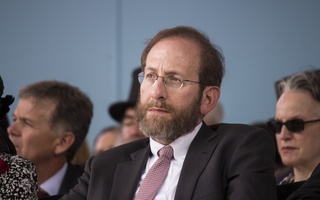University Provost Alan M. Garber ’76 attended a meeting of the Faculty Council—the Faculty of Arts and Sciences’ highest elected body—Wednesday to discuss administrative transparency with faculty, pledging to meet with the body once a semester.
The meeting comes on the heels of faculty criticisms of changes to the health benefits policy for Harvard’s non-union employees and the University’s approach to announcing and devising the changes.
Throughout last semester, faculty lamented their lack of representation on the University Benefits Committee, which included only one tenured FAS member—Government professor Daniel Carpenter.
{shortcode-8cf16528d6f9798a26a3dcecd72fb285c8d78b01}
Garber’s meeting with the Faculty Council comes after the release of a detailed fact sheet of the University’s health benefits expenditures on Friday. Though Faculty members said that they appreciate the efforts by University administrators to be more transparent about the health benefits policy and its implications, some said that the overall burden of cost to individuals affected by the policy was greater than costs to the University.
Following fierce opposition to the changes, the Faculty Council sent Garber a letter at the end of last semester inviting him to one of the group’s meetings to discuss the role of the faculty in future administrative decisions, according to Council members.
Garber wrote in an email that Wednesday’s meeting dealt with “consultation and communication for major policy changes,” and that he found the discussion at the meeting helpful. He also wrote that he met with the body last semester, and in previous academic years.
In a similar attempt to communicate with administrators, a group of Faculty members met with University President Drew G. Faust last semester to discuss the changed policy. This came after members of FAS unanimously voted to request that Faust and the Harvard Corporation reverse the policy at their November meeting.
The meeting with Faust, in part, was an effort to learn more about the University’s health benefits expenditures.
Related data were released in the fact sheet sent out earlier this week, stating that Harvard will save an estimated $6.4 million in Fiscal Year 2015 as a result of the policy changes. Additionally, the document estimated that costs will rise an average of $230.31 per affected non-union employee and that these employees will take on $2.5 million collectively.
“It’s a much higher percentage of the household budget for an employee,” History professor Maya R. Jasanoff ’96 said.
History professor Mary D. Lewis, for her part, said that although the fact sheet reported that less than 1 percent of affected families would reach the out-of-pocket maximum of $4,500, many people would barely come under threshold.
“How many people will reach $4,000, $3,500?” she said. “That’s still a lot of money for many people.”
Classics professor Richard F. Thomas, who along with Lewis and nine other faculty members co-wrote an op-ed in The Crimson criticizing the changes, agreed, noting that families could still pay a significant amount of money out-of-pocket.
“Couples with kids may not reach full amounts, but they may get pretty close,” Thomas said.
—Staff writer Karl M. Aspelund can be reached at karl.aspelund@thecrimson.com. Follow him on Twitter @kma_crimson.
—Staff writer Meg P. Bernhard can be reached at meg.bernhard@thecrimson.com. Follow her on Twitter @meg_bernhard.
Read more in Faculty News
Graduate Students Discuss Section Uncertainty Following SnowstormRecommended Articles
-
Faculty Seek To Push Back Against Benefits ChangesSeveral members of the Faculty of Arts and Sciences said they are weighing options for how best to push back against a new set of University health benefits plans they call “regressive,” even as a University spokesperson said Tuesday that the University does not plan to alter the policy for 2015.
-
Why the Health Plan ChangedYes, we anticipate that health care costs will continue to rise for Harvard—but these changes ultimately are designed to slow the rate that those costs will grow in coming years, ensuring fewer resources are diverted away from Harvard’s research and teaching mission, and offering a benefit that offers value to members of our community.
-
Health Benefits Plan Will ‘Likely’ Change in Future, Committee Members SayMembers of the committee that recommended controversial changes to Harvard’s non-union health benefits plan said it will likely change in the future.
-
 After Criticism, Harvard Offers Additional Health Benefits Plan
After Criticism, Harvard Offers Additional Health Benefits Plan -
 Garber Assures Faculty Research Funding is a Priority
Garber Assures Faculty Research Funding is a Priority













